
After Congress passes CAFTA by one vote in a midnight count, questions are being raised about the process. We speak with the Director of Public Citizen’s Global Trade Watch about the GOP leaders’ round-up of House votes to approve trade agreement. [includes rush transcript]
In a midnight vote, Congress narrowly approved the Central American Free Trade Agreement, or CAFTA. The final vote was 217–215 in the House, the closest margin possible as a tie vote would have blocked approval. Democratic Congressperson Marcy Kaptur said yesterday, “Compared to the vote a decade ago on NAFTA, which carried by a margin of only thirty-four votes, this vote was even more razor-thin. It barely crawled across the finish line.”
To pass the agreement, the White House and GOP leaders had to overcome resistance from dozens of Republican members who opposed CAFTA because of issues ranging from the threat to the US sugar industry to more general worries about the impact of global trade on U.S. jobs. To lobby wavering Republicans, President Bush made a rare visit to Capitol Hill and Vice President Dick Cheney reportedly spent hours personally lobbying Congress members.
Publicly, the Bush Administration has been selling CAFTA as a national security issue, rather than an economic issue.
- Scott McClellan, White House Press Secretary:
“It helps to strengthen democracy in our own hemisphere. This goes right to our own national security. This is an agreement that will help extend peace and prosperity throughout the Western hemisphere. While we’re working to advance freedom abroad we also need to be looking at our own hemisphere and make sure that we’re supporting the democratic efforts that continue to advance in our own hemisphere.”
Meanwhile, critics of the trade pact have been blasting the last-minute maneuvering by GOP leaders determined to pass the agreement.
When official voting had ended in the House at 11:17 pm, as the fifteen minute voting period had expired, legislators had actually voted to defeat CAFTA 180 (one hundred eighty) -175 (one hundred seventy five). But in an unusual move the final House vote was held open for an extra forty seven minutes, giving Republican leaders time to furiously round up holdouts in their own party until they had secured just enough to ensure approval.
- Nancy Pelosi, House Minority Leader:
“The Republicans turned the floor of the House of the Representatives into a “Let’s Make a Deal” set that was reminiscent of what happened at the time of the medicare prescription drug legislation that evening and again this time they kept the vote open a long time. But many of the overtures that were made to members was made before even going to the floor. So this is about again an abuse of power, an unethical way of passing legislation and depending on what members decide to do, may require further attention.”
Meanwhile, Republican Rep. Charles Taylor of North Carolina said he voted against the bill, but that a problem with the electronic voting system failed to record the vote.
- Lori Wallach, Director of Public Citizen’s Global Trade Watch
AMY GOODMAN: This is Scott McClellan, White House Press Secretary:
SCOTT MCCLELLAN: It helps to strengthen democracy in our own hemisphere. This goes right to our own national security. This is an agreement that will help extend peace and prosperity throughout the Western Hemisphere. While we’re working to advance freedom abroad, we also need to be looking in our own hemisphere and make sure that we’re supporting the democratic efforts that continue to advance in our own hemisphere.
AMY GOODMAN: That was White House Press Secretary, Scott McClellan. Meanwhile, critics of the trade pact have been blasting the last minute maneuvering by GOP leaders determined to pass the agreement.
JUAN GONZALEZ: When official voting had ended in the House at 11:17 p.m., as the fifteen-minute voting period expired, legislators had actually voted to defeat CAFTA, 180 to 175. But in an in an unusual move, the final House vote was held open for an extra 47 minutes, giving Republican leaders time to furiously round up holdouts in their own party until they had secured just enough to ensure approval. This is House Minority Leader Nancy Pelosi:
NANCI PELOSI: What I said was that the Republicans turned the floor of the House of Representatives into a “Let’s Make a Deal” set that was reminiscent of what happened at the time of the Medicare prescription drug legislation that evening, and again this time they kept the vote open a long time. But many of the overtures that were made to members was made before even going to the floor. So this is about again an abuse of power, an unethical way of passing legislation and, depending on what members decide to do, may require further attention.
AMY GOODMAN: That was California Congress Member Nancy Pelosi, Minority Leader of the House of Representatives, speaking on CNN. Republican Congress Member Charles Taylor of North Carolina said he thought he voted against the bill, but that a problem with the electronic voting system failed to record the vote. We’re joined right now in our Washington studio by Lori Wallach with Public Citizen’s Global Trade Watch. Welcome to Democracy Now!, Lori.
LORI WALLACH: Good morning, more or less.
AMY GOODMAN: Can you explain what took place? Start with that Taylor story.
LORI WALLACH: Well, as you said, if the vote had been 217-217, CAFTA would have gone down, and in fact, the vote probably really was 217-217. Even after a year-and-a-half of the White House pushing this NAFTA expansion, after the President was forced to make one of his first visits to Capitol Hill, literally in years, after Vice President Cheney set up shop literally off the floor of the Congress that night, with so much of the Cabinet trolling the halls of Congress that looked like a Cabinet meeting had become basically a roving craps game in the House of Representatives for the entire last week, after threats of cutting people off of committees, taking away all of their funding, after promises and luring in all of corporate America, what it came down to was ultimately, even with that, and for a trade agreement that for the U.S. is not very big economically of a deal, they had to make two people take a walk.
And what happened was there, mysteriously, was the computer problem that did not record the “no” vote of Congressman Charlie Taylor, a guy from the Carolinas, said he voted no. Funny thing, they held the vote open for 62 minutes, and somehow, even though there was a stadium-size scoreboard that has your name and either a green or a red light, Mr. Taylor didn’t realize that his vote wasn’t recorded and no one found him for an entire hour-plus to go fix that problem.
Then there was a second Member, Jo Ann Davis from Virginia, who claims she got stuck on her way back from the Boy Scout jamboree. Now, the hitch on that one is the Boy Scout jamboree event she was going to got canceled at 5:00, and this vote was at 11:30, and basically you could go by yak between where it was and the Capitol and still be here for the vote, if you intended to be there. Both of those members had agreed to vote no.
And that doesn’t even get, Amy, to the eight members of the Republican — eight Republican members of Congress who were committed to voting no, when, as you heard, they stopped the clock. The leftover members were Republicans, and they sat there and browbeat people. They got two other people to switch votes. Then they let two of those Republicans vote against it. It was disgusting. I mean, when I hear Scott McClellan talk about CAFTA and democracy, it should be CAFTA, the cancer on democracy. Because when you see what happened in our Congress, when you saw in Guatemala, for instance, the military was called out to shoot at peaceful Mayans marching towards the capital to protest and murdered two people, the military called out against civilians in violation of the peace accords, I mean, it’s just a perversion of democracy caused by this agreement before it would go into effect. It’s disgusting.
JUAN GONZALEZ: Well, Lori, while the administration says that this was really economically not that important, why then did it use such immense pressure on fellow Republicans to pass it? I mean, clearly there had been a lot of defeats in recent years around this whole issue of free trade, beginning with, obviously, the World Trade Organization, the Free Trade Area of the Americas, that there was before that the fast track legislation was defeated. Why did they feel such a need to get something through?
LORI WALLACH: Well, this is the good news and the bad news. The good news is CAFTA basically being truly of not that much economic significance, because all of six Central American countries in CAFTA’s annual GNP together is about equivalent to the annual activity, economically, of New Haven, Connecticut. The reason why it became a very big deal, was because, symbolically, it was like a referendum on the record of NAFTA. CAFTA was an expansion of NAFTA and that model, and in a way, it was a question about whether or not that model would have any viability. So this became a huge symbolic vote. The good news is that for that an agreement that didn’t really mean much economically, that it took that to sleaze it through, which they really, actually, if you counted all the votes, didn’t, bodes very well for the fact that the economically significant attempts to pursue that model further, like the hemisphere-wide NAFTA expansion, called the Free Trade Area of the Americas, is toast, if that’s what it took to get something like CAFTA through.
The bad news is for people in Central America, this is devastating. Right? I mean, the provisions are very clear: People with HIV and AIDS who need medicine, who use generics will die now, because they will not get generic drugs, because this agreement takes away the ability to produce generic drugs. People in Central America who rely on essential public services, their drinking water, electricity, education, or for instance in Costa Rica, the whole telecommunications system, government guaranteed access, has to be privatized and deregulated under this agreement. People’s difficult lives will be made much harder, or as Oxfam and the World Bank reported, millions of Central American Campesinos, small farmers, who are hanging on by their fingernails as it is, are going to get flattened by this agreement, and there are going to be millions of displaced and hungry people. Talk about instability. I mean, if it takes the military killing people to get the thing passed, and you know the results are going to be devastating, destabilizing, economically and socially, as a national security matter, but as a human, moral matter, what this is going to do in Central America, is God-awful.
And that is why, even though the vote has happened, there’s one more action for people of justice in the U.S., and that is to call the members of Congress, because there are a lot of them, despite all this beating, who did the right thing, and thank them and keep them buoyed-up and ready to fight on the next agreements, because there’s been incredible momentum, public education, new people brought to the fight for the future of finally boxing and burying this failed model. But for those members of Congress who voted wrong, they need to feel it 24/7. We can’t let the calls go away once the vote happens. If they voted wrong, they need to get three times more calls and come election time, the job that needs to be lost is theirs. And there are some people on whom we can do that. That’s how we win. That’s how we take the work that was done and the momentum on this vote, and we turn it into a real honest vote victory, because if you think of what they had to do, and the fact really of people — if all of the people had voted we would have won, it actually bodes well for our future, even though it’s horrific for what it’s going to do in Central America.
JUAN GONZALEZ: And Lori, I understand, one report I read said that the pharmaceutical companies got greater protection against generic drugs in this legislation than they have already in the United States.
LORI WALLACH: That’s true, and it’s a god-awful provision. It literally, the rule is, under CAFTA, every country has to adopt — has to modify all of their domestic laws to meet CAFTA’s rules. And CAFTA’s rule is that a generic drug company is not allowed to get access to the data that the brand name company used, the testing data to prove safety and efficacy, so that the generic company would theoretically have to do all of the studies over. Now, of course, that’s where the saving is. And typically, a generic company uses the information, the testing data that’s used to get the marketing approval, the right to sell the drug in a country, to get their own marketing approval.
AMY GOODMAN: Lori, we have five seconds.
LORI WALLACH: That’s now made a monopoly.
AMY GOODMAN: Lori Wallach, I want to thank you very much for being with us. Public Citizen’s Global Trade Watch is her organization.

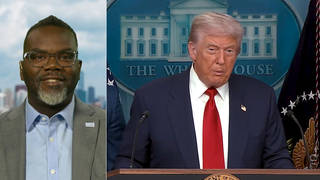
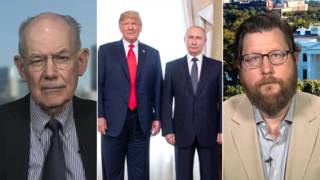
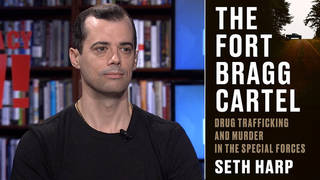
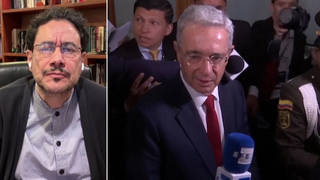





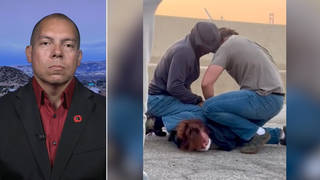
Media Options